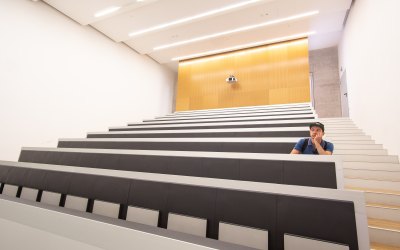In the late 1980s, Jon Lovitz played a character called the “Master Thespian” on Saturday Night Live. He strolled around a Victorian drawing room in a silk smoking jacket, puffed on a meerschaum pipe, and made ridiculous claims about his life and loves. When challenged, he would declare in a baritone voice that he was “acting!”
Whenever I think of Lovitz, which is more often than you’d expect, I am reminded of my drama teacher in college, Dr. Joyce Henry. Dr. Henry once said that, apart from a scene in As You Like It, we hadn’t produced one moment of real acting in the four years we studied under her. She wasn’t trying to be cruel, just honest. Ruthlessly honest.

I am getting that same sensation teaching. I have been teaching for more than twenty years and am just now figuring things out. Sure, I am beyond the teach-by-the-numbers technique of new Ph.D’s and the thoroughly doctrinaire “transformative learning” approach of Education Departments still enthralled with Paulo Freire and praxis. But up until recently, very recently, I couldn’t shake the feeling that I was no better than the Master Thespian. I was “acting.”
Here’s what did it. This semester, in just one class, I have had a student dealing with complications from the Cesarean birth of her son, a second whose mother died suddenly in Russia, a third who had to be admitted to the VA hospital for a combat wound that was giving him trouble, a fourth whose grandmother was hospitalized, and a fifth who is so stressed that he has started to stutter. And who knows what the others may be going through, including the kid who showed up one night with a nice shiner. I thought about telling him to keep his left hand up but decided against it. Age has its benefits.

Teaching isn’t easy. Each class is different and every group of students has its own rhythm, its own consciousness, and even its own unconsciousness. To paraphrase Heraclitus, I never step into the same classroom twice. I have to gauge where students are coming from and what they bring to the class. Then I have to assess the content and change it to keep up with current events and my own research. Finally, I need a certain amount of self knowledge so I can show students how I relate to the material and the questions I am thinking about. All of these relate to each other in a dynamic way.
One thing I have learned is that teaching is not about acting or performing. That is, it’s not about me. I have often thought that the best thing I could do for students is to get out of their way. But even if I were to do that, another problem arises. Students need direction and motivation (see Teaching Zebras).

Direction, because even childbirth and combat cannot prepare students for intellectual engagement and the potential threat to established beliefs. They need other muscles for that. Motivation, because most of them have been trained to care only about the banana dangling slightly out of reach in their cage. That banana, of course, is grades. But I refuse to be a zookeeper or primate lab technician with a clipboard. That demeans me and them, although I do like bananas.
Students have changed. They don’t study in the familiar ways anymore. They have evolved into digital beings, which means they require immediate (positive) feedback, images rather than words, and access to vast stores of information, much of it pre-processed. But they are also less reflective, more anxious, and shockingly ahistorical (see Hissy Fit 101). The Master Thespian might just as well have been around during the Punic Wars as far as they’re concerned. First, I’d have to explain that the Punic Wars is not a video game.
The upshot of all this is humility. I am humbled by my students’ complex lives, by the opportunity to teach them something they might remember at their 40th reunion (e.g., Aristotle), and by my own incompetence. I’m just glad most people think only about themselves and don’t even notice others, which means I see my incompetence but others usually do not. I hide it, pretending to be doing something else. The Master Thespian and I have that in common.
Image credits: feature by Roman Mager on Unsplash; masks by Francesco Ungaro on Pexels; classroom by Matthieu Joannon on Unsplash. Haven’t had enough? Go to Robert Brancatelli. The Brancatelli Blog is a member of The Free Media Alliance.



That what makes you a good teacher
Be careful Rob, always save something for yourself. I learned that the hard way in 30 years as a Social Worker. You cant change the world but you can always affect it, even by the little things you do. A joke, a nuance, a phrase or personal observation. As long as its honest and true.
Thanks, Bernie. I’ll try to be honest and true. Truthfully, it ain’t easy…